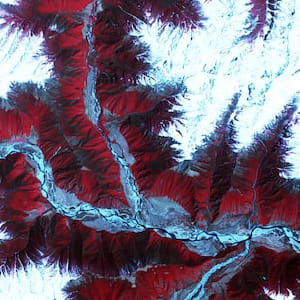paradise on earth: Idiom Meaning and Origin
What does ‘paradise on earth’ mean?
The idiom "paradise on earth" means a place or situation that is considered to be perfect, beautiful, and resembling paradise.

Idiom Explorer
The idiom "somewhere over the rainbow" refers to a place or situation that is idyllic or perfect, but is often unattainable or fictional.
The idiom "rose garden" metaphorically refers to a situation or place that appears pleasant and peaceful, but is, in reality, filled with hidden dangers or difficulties.
The idiom "roof over one's head" means having a place to live or having shelter. It emphasizes the basic necessity of having a roof to protect oneself from the elements.
The idiom "right on" is used to express agreement or approval with something that has been said or done. It is an informal phrase often used in casual conversations to indicate support or enthusiasm.
The idiom "ride off into the sunset" means to have a happy or satisfying ending or departure, often in a romantic or idealized way.
The idiom "reign supreme" means to have complete control or be in a position of undisputed power or authority.
The idiom "reign supreme" has a long history and its origins can be traced back to medieval times. It is derived from the combination of the word "reign," which means to hold royal office or to rule, and the word "supreme," which means the highest in rank or authority. Together, the idiom conveys the idea of holding a dominant or superior position.
An idiom used to describe someone or something that is highly unusual or unique; as rare as a rare animal.
The idiom "rainbows and unicorns" is used to describe a situation or perspective that is overly optimistic, idealistic, or lacking in realism.
Rainbows and unicorns is a commonly used idiom in the English language. It is often used to describe something that is overly optimistic, idealistic, or unrealistic. The idiom originated in the late 20th century and has gained popularity in recent years.
Put on the map is an idiom that means to gain recognition or become well-known. It refers to the act of bringing something or someone into public attention, making them more notable or important.
The idiom "put on the map" is a common expression used to bring something or someone to public attention or recognition. It signifies making someone or something known, usually in a positive way, to a wider audience or community.
The idiom "put on a pedestal" means to admire or worship someone or something to an excessive extent, often idealizing them and treating them as if they are perfect or infallible.
Elysian Revelations
Paradise on earth is an idiom that describes a perfect or ideal place or situation. It has its roots in various religious and philosophical beliefs. In Christianity, paradise refers to the Garden of Eden, a heavenly paradise described in the Book of Genesis. The Islamic tradition also speaks of paradise, known as Jannah, as a place of eternal bliss for believers. Ancient Greek philosophy used the term "Elysium" to describe a heavenly abode for heroes and righteous individuals.
The idiom can also be found in the literary and cultural history of different regions. For example, ancient Persian literature includes the concept of "Farahavar," representing a paradise-like state of existence. Chinese folklore tells of the "Peach Blossom Spring," a hidden utopia embodying the ideal of a peaceful and idyllic life.
The idiom is often used to depict earthly places or situations that are regarded as paradisiacal. It is commonly used to describe stunning natural landscapes, like pristine beaches, lush gardens, or breathtaking mountain ranges. It can also refer to specific destinations or tourist spots known for providing exceptional experiences of enjoyment, relaxation, and beauty.
It's important to note that the idiom is not always meant to be taken literally. Instead, it represents a metaphorical ideal or aspiration for a perfect state of being or environment, free from suffering, stress, or negativity. It expresses the desire for a utopian existence, a yearning for a world that goes beyond the limitations and imperfections of reality.
As with any idiom, the interpretation of paradise on earth may vary depending on cultural background, personal beliefs, and context. Some may see it as an unattainable fantasy, while others find solace and inspiration in the pursuit of their own versions of paradise. In a world filled with challenges and complexities, this idiom offers a glimpse of an alternative reality, a world full of infinite possibilities and boundless beauty.
On the other hand, the idiom "hell on earth" is used to describe a place or situation that is extremely unpleasant or unbearable. It represents a state of suffering, chaos, or despair. Just as paradise on earth represents the ideal, "hell on earth" symbolizes the opposite. It serves as a reminder of the darkest aspects of human existence, the depths of pain and suffering that can be experienced in this world.
While paradise on earth may seem like an unattainable dream, the idiom "a better place" offers a more realistic and optimistic perspective. It implies the possibility of improving one's current situation or seeking a more desirable alternative. This idiom recognizes that life is full of opportunities for growth, change, and personal fulfillment. It encourages individuals to strive for a better future, to create their own versions of paradise in their lives.
Whether it's the yearning for a heavenly paradise, the recognition of the depths of suffering in "hell on earth," or the pursuit of a "better place," these idioms reflect our complex relationship with the world we live in. They capture our aspirations, our desires for a more fulfilling existence. Ultimately, they remind us that while we may not be able to create a perfect paradise on earth, we can always strive to make the world a little bit better, one step at a time.
Example usage
Examples of how the idiom "paradise on earth" can be used in a sentence include:
- After a long hike, reaching the mountain's summit felt like paradise on earth.
- For Jane, spending time at the beach is her idea of paradise on earth.
- The beautiful gardens at the resort were like a small paradise on earth.
More "Utopia" idioms
We missed the mark - nothing found.

